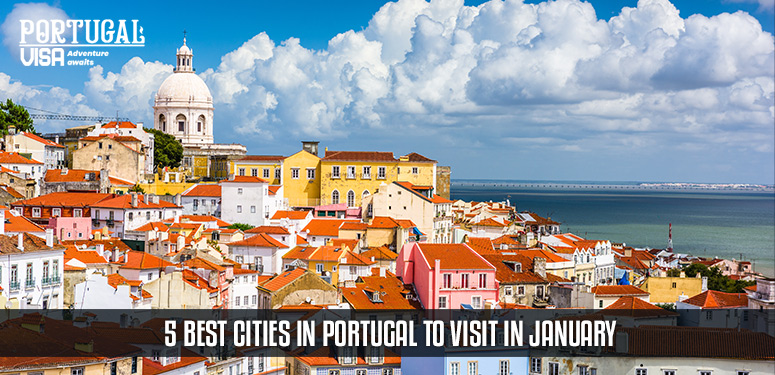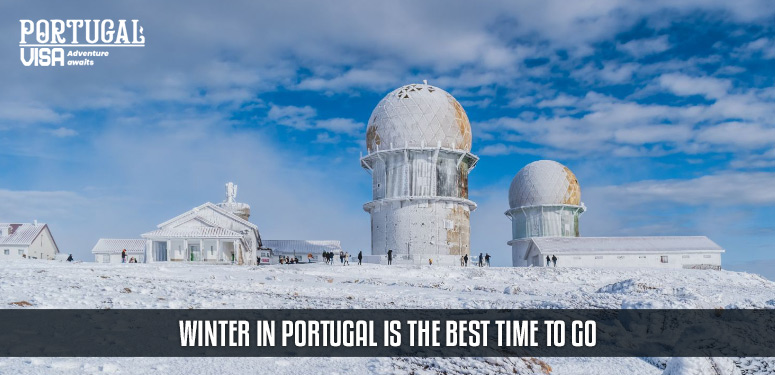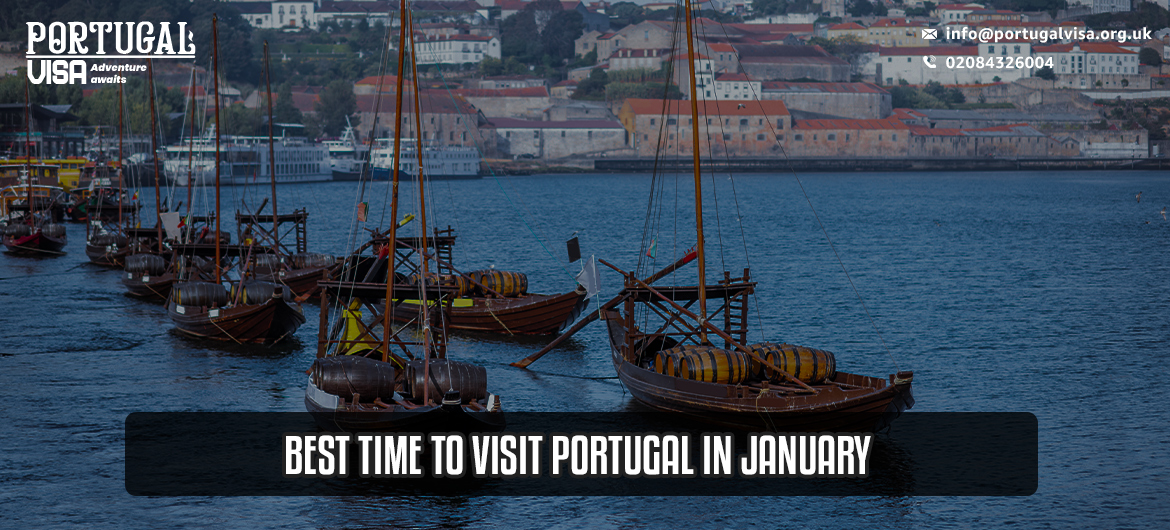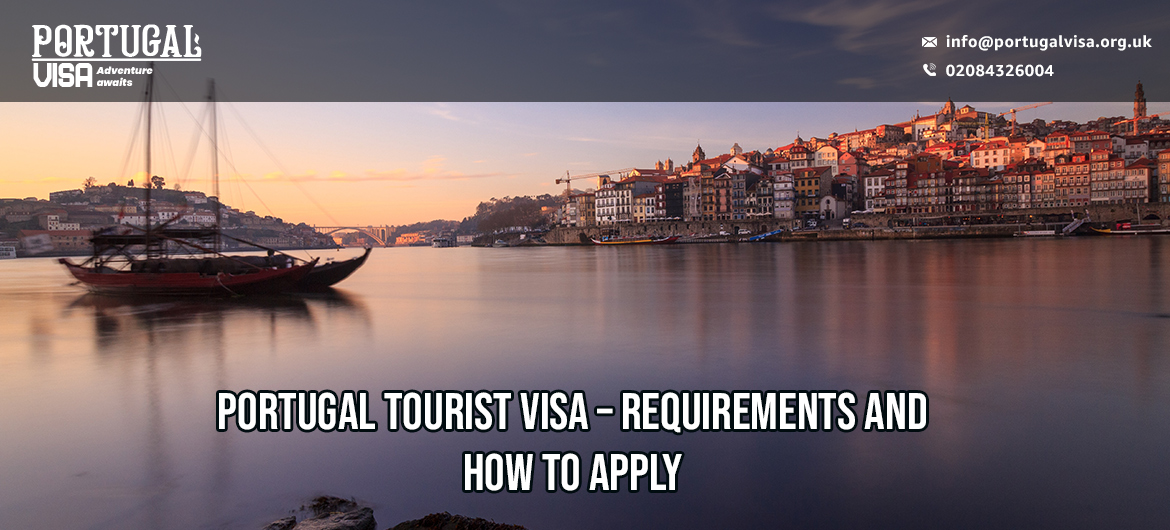Best Time & Weather to Visit Portugal in January 2024
Is it worth visiting Portugal in winter? What’s the Portugal January weather?
Embarking on a journey to Portugal in January might not be the first choice for many travelers, but the winter months provide a unique and enchanting experience. Traveling to Portugal in winter means you’ll encounter fewer crowds, have an easier time booking tours, accommodation, and restaurants, and you’ll be able to have more of a positive impact on Portugal’s tourism industry. Get Portugal Tourist Visa
During winters, Portugal offers an exciting mix of stunning scenery, vibrant culture, and delicious cuisines, making it an excellent destination for British tourists all year round. As the winter chill sets in, Portugal beckons with its unique blend of historical charm, scenic landscapes, and a mild Mediterranean climate. Thus, January is an intriguing time to visit this Iberian gem, offering a different perspective on its cities.
In this detailed guide, we’ll delve into the weather conditions of Portugal’s key cities, offering insights into why January is an excellent time to explore the cultural richness and historical wonders of this captivating country.
What is the Weather like in Portugal in January?
Winter in Portugal spans from December to March and is characterized by mild temperatures with an average maximum of 17°C (62°F) and an average minimum of 10°C (50°F). This period offers a welcome escape from the harsher winter conditions in many other parts of Europe.
Which Month is the Coldest in Portugal?
January takes the crown as the coldest month in Portugal, but fear not – the winters are generally mild and sunny, presenting several benefits for those willing to explore Portugal’s January weather.
5 Best Cities in Portugal to Visit in January

- Lisbon: A Historical Haven
Lisbon, the capital city, is a testament to Portugal’s rich history and vibrant culture. Despite the winter chill, with Lisbon, Portugal’s January weather ranging from 8 to 15 degrees Celsius (46 to 59 degrees Fahrenheit), iconic landmarks like Belem Tower and Jerónimos Monastery retain their enchanting allure. Pack a jacket and immerse yourself in the authentic Portuguese atmosphere of Alfama’s narrow streets.
Temperature: 8°C to 15°C/46°F to 59°F
Key Highlights: Ride the famous tram, gorge on flaky pasties de nata, listen to live Fado, and browse boutiques for tinned sardines, sweet-smelling soaps, and other cute souvenirs to take home
Explore the excitement in our Travel Guide Book Review: Backpacking Centurion Vol. 2 & 3. Uncover hidden treasures
- Porto: Riverside Romance
Though it often plays second fiddle to Lisbon, Portugal’s second-largest city is no less charming. Perched along the Douro River, a cascade of colorful houses and dramatic bridges forms one of Europe’s most iconic skylines.
Portugal’s second-largest city, Porto, may experience slightly cooler temperatures in January (5 to 13 degrees Celsius or 41 to 55 degrees Fahrenheit). Further, the Douro River and historic Ribeira district create a picturesque setting even in winter. Therefore, take the chance to warm up with the city’s famous port wine.
Temperature: 5°C to 13°C / 41°F to 55°F
Key Highlights: Climb the Clérigos Tower for a view, sip coffee in a historic cafe, sample the city’s finest export and Port wine
- Faro: Algarve’s Cultural Hub
It is the capital of the Algarve, the country’s southernmost region (excluding the islands), and the best city in Portugal for accessing the country’s top beaches.
Also see, Portugal Travel Guide: Everything You Need to Know Before You Go
It offers milder weather, with Faro Portugal January weather ranging from 8 to 16 degrees Celsius (46 to 61 degrees Fahrenheit). Therefore, the historic Old Town and nearby Ria Formosa Natural Park provide plenty of cultural and natural attractions.
Temperature: 8°C to 16°C/ 46°F to 61°F
Key Highlights: Plaza, Largo da Sé, features whitewashed buildings, cobbled roads, and an ancient cathedral
- Évora: A UNESCO World Heritage Gem.
The capital of Alentejo, southern Portugal, Évora, is a city with a long history. It was a major destination along the main trading route with Spain and served as an important religious center.
Hence, venturing into the Alentejo region, Évora boasts a continental climate with Algarve Portugal January weather from 4 to 14 degrees Celsius (39 to 57 degrees Fahrenheit). This UNESCO World Heritage city offers a glimpse into Portugal’s rich history, with landmarks such as the Roman Temple and the Cathedral of Évora.
Temperature: 4°C to 14°C / 39°F to 57°F
Key Highlights: Roman Temple, Cathedral of Evora, Capela dos Ossos
- Coimbra: Where History Meets Academia
One of Portugal’s fourth most significant cities, Coimbra is home to a long, rich history, culture, and centuries-old architecture. It’s a world-renowned university, one of the oldest in Europe. Even with all that history, Coimbra has a beautiful, hip, youthful atmosphere with warm, friendly locals.
Want to explore Dubai that looks so gorgeous then you need to get Dubai tour holiday packages for your entire trip with best all inclusive.
January is an excellent time to visit Coimbra. The weather is usually hot with a gentle breeze. Between Lisbon and Porto, Coimbra experiences similar temperatures in January (5 to 14 degrees Celsius or 41 to 57 degrees Fahrenheit). Therefore, it is one of the world’s oldest universities; its medieval architecture and the Mondego River accentuate the city’s historic charm.
Temperature: 5°C to 14°C/41°F to 57°F
Key Highlights: Monastery of Santa Cruz, Machado de Castro National Museum, and Portugal dos Pequenitos Miniatures Park
Winter in Portugal is the Best Time to Go

Are you ready to plan your visit to Portugal in winter?
Without a doubt, visiting Portugal in winter allows you to avoid crowds, travel flexibly, and experience some of the country’s unique winter traditions and festivals. Thus, it’s the perfect time to explore bustling cities and embark on outdoor adventures along picturesque hiking trails.
Conclusion
In conclusion, January in Portugal offers a captivating blend of cultural exploration and natural beauty. Embrace the winter tranquillity, avoid the crowds, and discover the unique charm of Portugal’s cities during this off-season month.
Let’s embark on a virtual journey through some of Portugal’s notable cities and explore the weather conditions that shape travelers’ experiences during this winter month.
Book your Portugal visa Appointment from the UK, start your Portugal adventure today, and create memories that will last memories. Apply for a Portugal visa from the UK, and get ready to experience the magic of Portugal.
FAQs
January is winter in Portugal, and temperatures can vary. For example, Lisbon and Porto can have Portugal’s daytime temperature in January ranging from 8 to 15 degrees Celsius (46 to 59 degrees Fahrenheit). It’s advisable to bring layers and a waterproof jacket as rain is not uncommon.
January is considered the off-peak season, so you can expect fewer tourists than summer. This can be advantageous if you prefer a more relaxed and less crowded experience.
Pack layers, including a warm jacket, as temperatures can be extraordinary. Remember waterproof clothing and comfortable shoes for walking. It’s also a good idea to bring an umbrella and check the weather forecast before your trip.
While the beaches may not be ideal for swimming due to cooler temperatures, the coastal areas can still be beautiful for a stroll. Thus, some surfers may take advantage of the winter waves, and you can enjoy the scenic coastal views.
Typically, the standard processing for the online Portugal visa application takes 12 to 15 calendar days, which may be extended if the supporting documents need to be presented as required or for other justified reasons.
To apply for a Portugal visa, you need to follow simple steps:
Firstly, fill out the Application form online mode
Secondly, We will book a Portugal visa appointment for you at the Visa Centre
Next, Carry all the necessary documents to the visa center
Subsequently, you’ll get your passport via post along with your visa.







